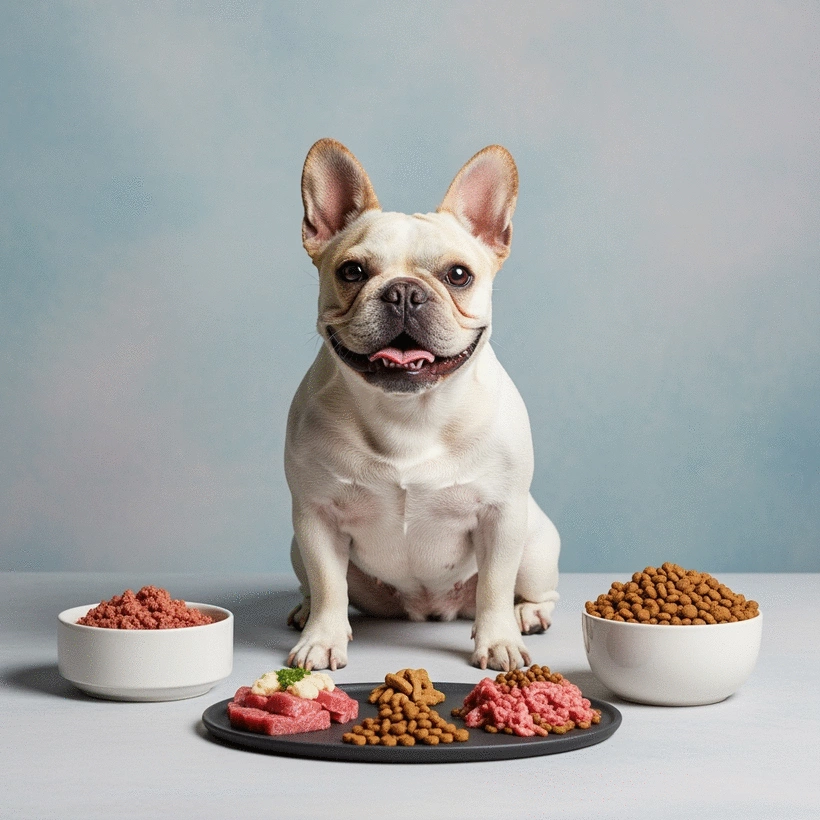French Bulldog Food Options in Australia

Did you know that the right diet can significantly enhance the health and happiness of your French Bulldog? Understanding their unique nutritional needs is essential, especially in Australia’s climate. Here’s what you can learn about feeding your furry friend.
What You Will Learn
- High-quality protein sources like chicken and fish are vital for muscle development and energy.
- Incorporating healthy fats, such as omega fatty acids, supports skin and coat health, crucial for this breed.
- Understanding common health issues can guide dietary choices to manage allergies and support joint health.
- Transitioning to new dog food should be done gradually to avoid digestive issues.
- Regular monitoring of your dog’s health during dietary changes can provide insights into their overall well-being.
- Engaging with your vet and the pet community can help you make informed choices for your pup's diet.
The Pillars of French Bulldog Nutrition: Key Focus Areas
Delving into the essential components that shape a healthy diet and lifestyle for French Bulldogs, especially in the Australian context. Below, we highlight the core elements that ensure their well-being. For more insights on general care, check out our guide on vet tips for your French Bulldog.
Essential Nutrients
- High-Quality Protein
- Healthy Fats (Omega)
- Vitamins & Minerals
Health Issues & Diet
- Allergy Management
- Joint Health Support
- Weight Management
Informed Choices & Transition
- Gradual Food Transition
- Monitor Health Changes
- Vet Recommendations
Community & Research
- Share Experiences
- Read Reviews
- Explore Local Brands
Understanding the Nutritional Needs of French Bulldogs in Australia
As a proud French Bulldog owner, I've learned that understanding the nutritional needs of our beloved companions is crucial for their overall health and happiness. In Australia, the climate and lifestyle can significantly impact what your Frenchie needs in their diet. Let’s dive into the essential nutrients that will help keep your French Bulldog healthy and thriving!
Essential Nutrients for Optimal Health
When it comes to feeding your French Bulldog, focusing on high-quality ingredients is key. A well-balanced diet should include a variety of essential nutrients to promote their well-being:
- High-Quality Protein Sources: Ensuring your Frenchie gets adequate protein is vital for muscle development and energy. Look for dog foods that list real meat, like chicken or beef, as the first ingredient.
- Healthy Fats: Omega fatty acids support skin and coat health, which is essential for this breed prone to skin issues.
- Vitamins and Minerals: Adequate vitamins, such as A, E, and D, along with essential minerals like calcium and phosphorus, help maintain strong bones and overall health.
Beyond just protein and fat, it’s important to avoid artificial additives and fillers in your French Bulldog’s diet. These ingredients can lead to health issues over time.
High-Quality Protein Sources
High-quality protein sources are particularly important for French Bulldogs. These energetic little pups need a diet that supports their active lifestyle. When choosing dog food, look for options that specify the type of meat used, such as chicken, lamb, or fish. These proteins not only provide energy but also help maintain their muscle mass. For more specific dietary guidance, consider our French Bulldog diet tips for Aussies.
Some great protein options include:
- Chicken
- Turkey
- Lamb
- Fish
- Beef
Avoiding Artificial Additives and Fillers
As a dedicated advocate for responsible pet ownership, I advise against feeding your French Bulldog food that contains artificial additives, preservatives, or fillers. These ingredients offer little nutritional value and can lead to health complications. Instead, opt for natural dog foods that use whole ingredients. Your Frenchie deserves the best!
Common Health Issues and Dietary Impact
Understanding the common health issues that French Bulldogs face can guide us in making informed dietary choices. Their unique physical characteristics often predispose them to certain conditions, which can be managed through proper nutrition. Here are a few key areas to consider:
- Managing Allergies through Nutrition: Many French Bulldogs suffer from allergies, often linked to their diet. Identifying and eliminating allergens can lead to significant improvements in your dog's well-being.
- Supporting Joint Health: Joint problems are common in this breed, particularly as they age. Nutritional support, like Omega fatty acids, can help maintain mobility.
- Understanding the Nutritional Needs of Overweight French Bulldogs: French Bulldogs can easily become overweight, which can exacerbate existing health issues. Monitoring their caloric intake and providing a balanced diet is essential to keep them healthy!
Managing Allergies through Nutrition in French Bulldogs
For many French Bulldogs, allergies can stem from diet. If you notice your pup scratching or having gastrointestinal issues, consider switching to a hypoallergenic dog food. Foods that feature a single source of protein and limited ingredients can be beneficial. I’ve found that many Frenchie owners have seen improvements after making these changes!

Supporting Joint Health with Proper Diet
Joint health is crucial, especially for French Bulldogs who often experience joint issues as they age. Incorporating joint supplements or formulas specifically designed for joint support can make a difference. Look for foods enriched with glucosamine and chondroitin to help maintain their mobility.
Understanding the Nutritional Needs of Overweight French Bulldogs
Overweight French Bulldogs face numerous health risks, so it’s essential to tailor their diet to maintain a healthy weight. Manage portion sizes and consider high-protein, low-calorie dog foods. Regular exercise and monitoring their weight can also play a significant role in their overall health! For further strategies, explore our guide on managing your French Bulldog's calories.
Since the search results do not provide a suitable video that directly compares commercial foods for French Bulldogs in Australia, I cannot generate the embed code for such a specific video. However, you might consider using a video that discusses general nutrition for French Bulldogs or reaching out to a channel that focuses on pet nutrition for a more tailored option. If you'd like to embed a video discussing French Bulldog nutrition in general, one option could be the video about French Bulldog nutrition by Royal Canin, but it does not specifically compare wet, dry, and raw options in Australia. Here's how you could embed a video like that if it were suitable:However, this does not meet the specific criteria of comparing wet, dry, and raw options in Australia. You might need to search further or contact a specific channel focused on pet nutrition for more tailored content.
Pro Tip
Did you know? Incorporating a variety of protein sources in your French Bulldog's diet not only promotes better health but also keeps mealtime exciting for your pup! Consider rotating between chicken, lamb, and fish to provide a balanced intake of essential nutrients and prevent any potential food allergies.
Making Informed Choices for Your French Bulldog's Diet
When it comes to feeding our French Bulldogs, making informed choices is essential for their health and happiness! Transitioning between different food types can be a bit tricky, but with the right approach, you can ensure a smooth change. Let's dive into how to do this effectively.
How to Transition Between Different Food Types
Changing your Frenchie's diet can be necessary for various reasons, such as allergies or simply wanting to provide a new flavor. The key is to do it gradually to avoid upsetting their stomach. Here’s a simple step-by-step guide:
- Start by mixing a small amount of the new food with their current food.
- Gradually increase the proportion of the new food over 7-10 days.
- Watch for any signs of digestive issues, such as vomiting or diarrhea.
- If all goes well, continue with the new food!
By following these steps, you can help your French Bulldog adjust comfortably to their new diet. Remember, patience is key! Every dog is unique, and some may take longer to adapt than others.
Monitoring Your Dog's Health with Dietary Changes
As a French Bulldog enthusiast, I know firsthand how important it is to keep an eye on your pup's health during any dietary transition. Regularly monitoring their behavior, energy levels, and coat condition can offer valuable insights. Here are some indicators to look out for:
- Changes in appetite—are they eager to eat or avoiding their food?
- Shiny, healthy coat versus dullness or excessive shedding.
- Energy levels—are they active and playful or lethargic?
- Regular and firm stool as a sign of good digestion.
If you notice any concerning changes, don’t hesitate to consult your vet. It’s always better to address potential issues early on! Your Frenchie’s health is paramount.

Veterinary Recommendations for Dog Foods
Your veterinarian can be an invaluable resource when it comes to selecting the best food for your French Bulldog. They can provide tailored advice based on your dog's specific needs and health conditions. When visiting your vet, consider asking:
- What type of diet do you recommend for my dog's age and activity level?
- Are there specific brands you trust for French Bulldogs?
- What should I look for in ingredient labels?
By engaging with your vet, you're taking an essential step towards making informed dietary choices for your furry friend! Remember, knowledge is power when it comes to your French Bulldog’s nutrition.
FAQ: French Bulldog Nutrition in Australia
Here are some frequently asked questions about French Bulldog nutrition, based on the topics discussed in this article:
- Q1: What are the most important nutrients for a French Bulldog in Australia?
- A1: High-quality protein sources (like chicken, lamb, fish, beef) for muscle development and energy, healthy fats (omega fatty acids) for skin and coat health, and adequate vitamins and minerals (A, E, D, calcium, phosphorus) for overall health and strong bones.
- Q2: Why should I avoid artificial additives and fillers in my French Bulldog's food?
- A2: Artificial additives, preservatives, and fillers offer little nutritional value and can lead to various health complications over time. Opting for natural, whole ingredients is always better for your Frenchie's well-being.
- Q3: How can diet help manage allergies in French Bulldogs?
- A3: Many French Bulldogs suffer from diet-related allergies. Switching to hypoallergenic dog foods with a single protein source and limited ingredients can help identify and eliminate allergens, leading to significant improvements in their health.
- Q4: What should I look for in dog food to support my French Bulldog's joint health?
- A4: Look for dog foods enriched with joint supplements like glucosamine and chondroitin. These ingredients can help maintain mobility and reduce the impact of joint issues common in the breed as they age.
- Q5: What's the best way to transition my French Bulldog to a new food?
- A5: Transition gradually over 7-10 days. Start by mixing a small amount of the new food with their current food and slowly increase the proportion of the new food while monitoring for any digestive issues like vomiting or diarrhea.
Engaging with the Pet Community
As part of the French Bulldog Guide community, sharing experiences and learning from one another enriches our journeys as pet parents! Connecting with other French Bulldog owners can provide valuable insights into nutrition and care.
Sharing Experiences and Tips with Other French Bulldog Owners
Have you ever wondered how other owners manage their Frenchie's diets? Engaging with fellow enthusiasts can help you discover new food options, share recipes, or even find solutions to common issues. Consider joining local pet forums or social media groups dedicated to French Bulldogs to exchange tips and stories!
Looking for Vet Recommendations on Dog Foods
Don’t forget to tap into the wisdom of your local vet and pet community! Many dog owners share their experiences with specific brands, and this can guide you in making better choices. Plus, it’s a great way to meet fellow French Bulldog lovers!
Reading Dog Food Reviews and Customer Ratings
Before settling on a specific dog food, it’s wise to read reviews and check customer ratings. Websites and forums are filled with valuable feedback from other Frenchie owners. Look for:
- Overall satisfaction from other pet parents.
- Reports of changes in health or behavior after switching foods.
- Recommendations from veterinarians and pet nutritionists.
By doing your research, you’ll feel confident that you’re providing the best for your French Bulldog. Your dedication to their health shines through!
Summary and Next Steps for Your French Bulldog’s Nutrition
As we wrap up this section, remember that nurturing your French Bulldog's dietary needs is an ongoing journey. Reassessing dietary choices as your dog ages will help ensure they thrive through all life stages. Also, learning about French Bulldog health issues explained can further empower you to make informed decisions.
Revisiting Dietary Choices as Your Dog Ages
It's crucial to adjust your Frenchie's diet as they mature. Their energy levels, health conditions, and nutritional needs will evolve, so staying proactive is key! Check in with your vet regularly to ensure their food is still the best fit.
Encouragement to Explore Local Australian Brands
Australia is home to fantastic local pet food brands that cater specifically to our climate and our beloved breeds. Exploring these options not only supports local businesses but also provides your French Bulldog with quality nutrition tailored to their needs!
The Importance of Pet Health and Wellness in Nutrition
Ultimately, your French Bulldog's health and wellness are directly linked to their nutrition. By making informed choices, engaging with the community, and staying updated on dietary needs, you're setting your furry friend up for a long, happy life! Let’s continue this journey together!
Recap of Key Points
Here is a quick recap of the important points discussed in the article:
- High-Quality Protein Sources: Include real meat like chicken, turkey, or lamb as the first ingredient in your French Bulldog's diet for optimal muscle development and energy.
- Avoid Artificial Additives: Steer clear of food with artificial additives and fillers to promote better health and prevent long-term issues.
- Monitor Health Indicators: Regularly check your Frenchie's appetite, coat condition, energy levels, and stool quality to ensure they are thriving on their diet.
- Transition Food Gradually: When changing your dog's diet, mix new food with current food gradually over 7-10 days to avoid digestive issues.
- Consult Your Vet: Regular vet consultations can provide tailored advice on dietary needs and help you choose the best food for your French Bulldog's specific health conditions.








